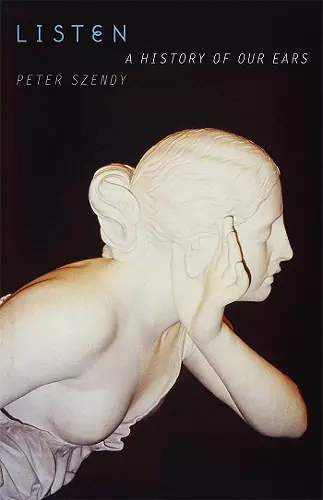Listen
A History of Our Ears
Format:Hardback
Publisher:Fordham University Press
Published:15th Jan '08
Should be back in stock very soon

In this intimate meditation on listening, Peter Szendy examines what the role of the listener is, and has been, through the centuries. The role of the composer is clear, as is the role of the musician, but where exactly does the listener stand in relation to the music s/he listens to? What is the responsibility of the listener? Does a listener have any rights, as the author and composer have copyright? Szendy explains his love of musical arrangement (since arrangements allow him to listen to someone listening to music), and wonders whether it is possible in other ways to convey to others how we ourselves listen to music. How can we share our actual hearing with others?
Along the way, he examines the evolution of copyright laws as applied to musical works and takes us into the courtroom to examine different debates on what we are and aren’t allowed to listen to, and to witness the fine line between musical borrowing and outright plagiarism. Finally, he examines the recent phenomenon of DJs and digital compilations, and wonders how technology has affected our habits of listening and has changed listening from a passive exercise to an active one, whereby one can jump from track to track or play only selected pieces.
"Swerving away from the grand abstractions of late-deconstructive theory, the book has no labyrinthine close-readings, no world-historical announcements, and ties itself in no tortured linguistic knots." -Current Musicology "Szendy's meditation on listening and on music is a dreamlike mixture of philosophy, personal memoir, and intellectual history. Listening is not hearing (perception or sensation), but neither is it understanding ("entendre"), as opera especially makes clear, in those ecstatic moments when the libretto is least important, and the human voice suspends all sense, but holds the listener most. What subject is brought into being in such moments, beyond the interiority of the person, as a relation to the world and to others with whom one shares (or disputes about) this experience? And how has the history and transmission of such listening, especially in music, been caught in the great questions of law and copyright, citation, quotation, reproduction and sampling, original text and its "translation" in performance (a secondary repetition without which music cannot exist)? How are the questions of instrumentation and mechanical reproduction, so dear to Walter Benjamin, Theodore Adorno and other theorists of modernity, played out in the economy of the listening ear? And how are these issues aggravated today by advertizing and media that sample and distribute, but also copyright and turn into property even those random noises -- the sound of a car engine or the tone of a cell phone -- which become the identifying markers or signatures of multinational corporations, where the border between music and noise is negotiated. From Lizst and Beethoven to Schoenberg and Stravinsky, from Charlie Parker and Bill Evans to more recent experiments in digital sampling, Szendy takes us across a wide territory with an ease and lightness that are beautifully rendered in Charlotte Mandell's translation." -- -Charles Shepherdson University at Albany, State University of New York "Every child knows about the right to speak, and when to shut up and listen. But do we know what listening is? In this book Peter Szendy asks who has the right to listen when it comes to music. It turns out that listening is a species of theft disguised under polite terms like transcription and arrangement, but it is mischief all the same. There may be no such thing as a work of music. Szendy gives us a rogue's history of the ear, filled with splendid and hilarious anecdotes about the things we do to music, and the uncanny machines we have used on it, tin ears among them. Read this book and find out what you have an ear for." -- -Gerald Bruns University of Notre Dame
ISBN: 9780823227990
Dimensions: unknown
Weight: unknown
176 pages